RationaleAimThere is an existing interest in the sociological argument of the educational attainment of boys and girls and how girls are achieving more than boys. However this is a bit too ambitious as being able to produce a representative sample would be too time consuming and costly. The scope would be too large to produce a subjective view.
The main aim as a researcher who believes strongly in equality of opportunity, is to see 'how social class can effect the educational attainment of boys and girls'. This would provide a large unbiased representative sample, that is not too time consuming or costly.
Some researchers argue that class differences in attainment result from the sifting, sorting and assessment of pupils in terms of teacher's perceptions of social class, ability and conduct. Whilst others believe that class differences are primarily due to what happens outside of school. They believe that it is due to social inequalities generated by the class structure.
From this point of view school does little more than reflect existing inequalities.
The second aim is to cover factors outside school such as material deprivation, cultural deprivation and parental choice, this can be done by asking if they have up to date equipment necessary for educational attainment such as computers/internet books etc. what their parental occupation is and who chose the school their child is to attend.
The third aim is to cover factors inside school such as streaming (sets) and labelling, it is a combination of all of these that result in class inequalities in educational attainment.
Douglas and Sugarman (1970) claim that differences in educational attainment are due to being deprived both culturally and materially. However it is not necessarily the social class that effects educational attainment but the factors within and opportunities surrounding class. Many comparisons within...



Grammar issues
I like the inclusion of the questionnaire but did find a lot of grammar problems within the paper. Overall I think it would be better if thoroughly proofread.
2 out of 2 people found this comment useful.